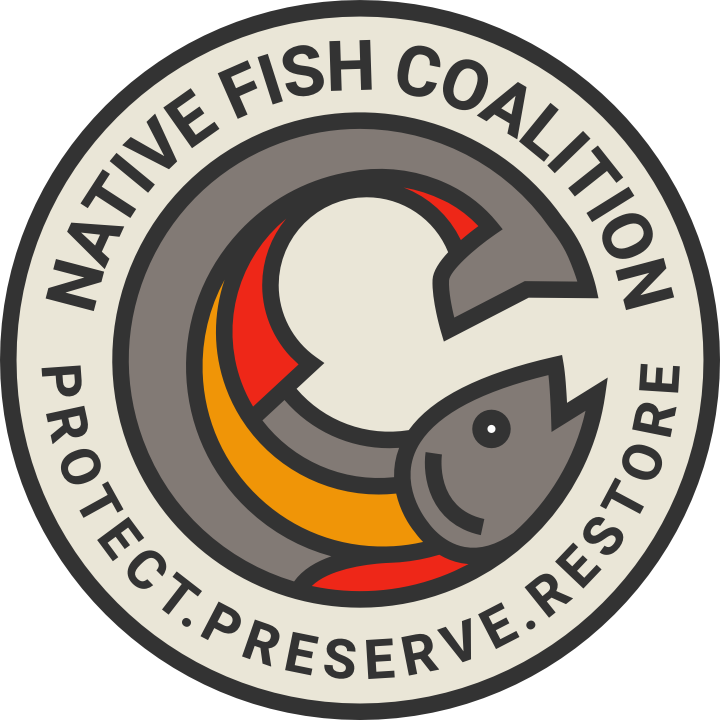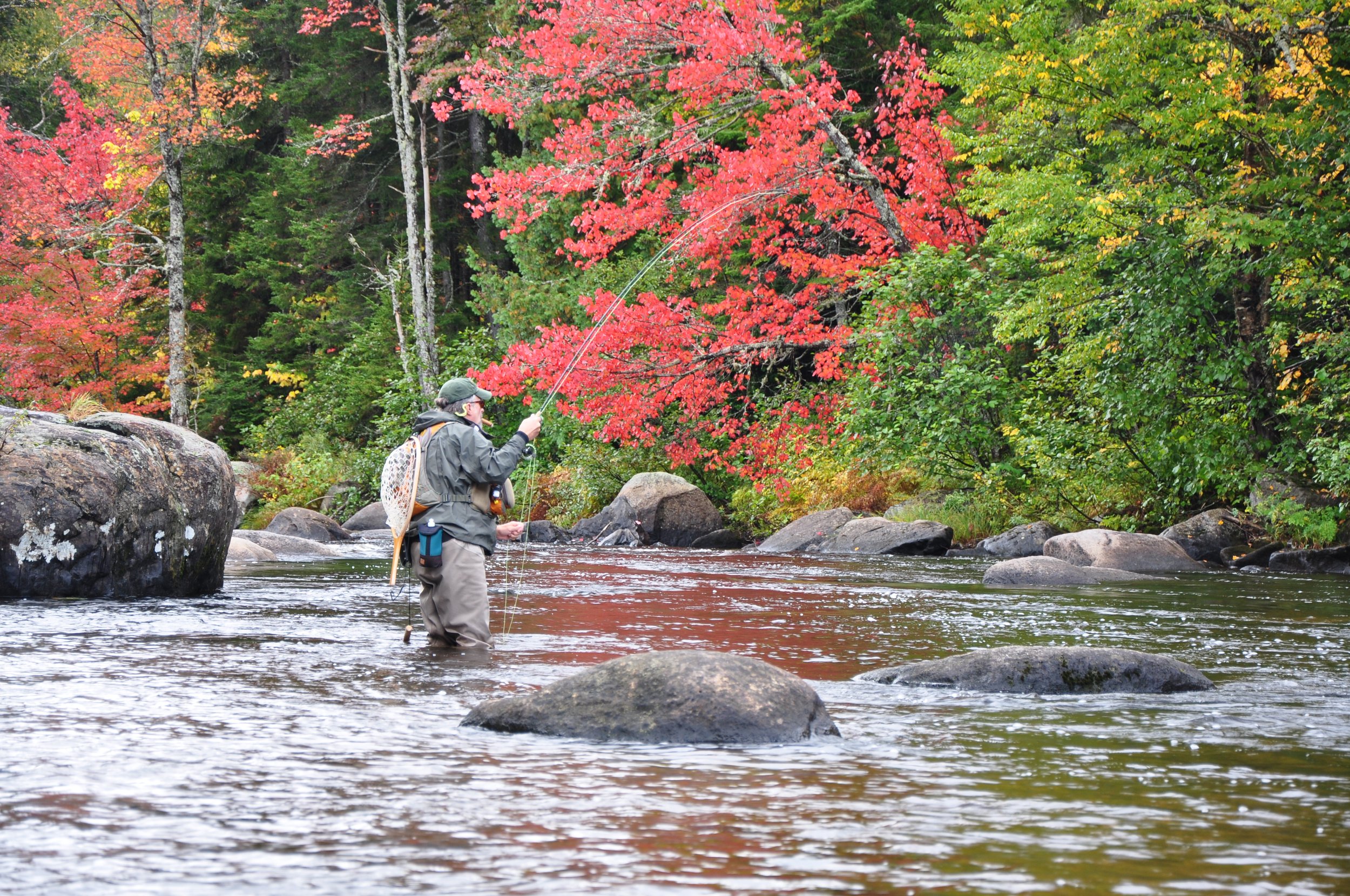NFC Executive Director Bob Mallard: Fall Fishing Explained (Bangor Daily News)
“As often happens on the www, things got personal. One person referred to me as a “self-proclaimed fish advocate.” Another said that anything I say is wrong and not worth hearing. One person implied that the poor fall fishing I was experiencing was a result of a lack of prowess...”
NFC Executive Director Bob Mallard recently wrote about extended the fall fishing season in Maine. His article was met with opposition by some members of the Maine fly fishing. Much of what was said challenged what folks interpreted as absolutes in what was meant to be a general recommendation not a specific mandate.
What folks missed was that the article was as much about fish as it was fishing. If they knew Bob, they’d know that he rarely writes about fishing these days, and when he does there is almost always an underlying wild native fish conservation message. The intent is to use fishing to get people talking about issues affecting our wild native fish.
In this case, Bob looked to get people talking about the fact that our weather is changing, and some would say notably. Insect hatches are coming earlier and later, ice fishing season is getting shorter, and after generations of relative consistency, fall fishing is no longer what it once was.
Click below or read unedited text below to read Bob’s rebuttal to those who challenged his initial article.
“The bio picture of one person who was concerned with the impact of extending the season shows 10 dead wild native brook trout on a stick...”
As Submitted
Fall Fishing Explained…
My recent article on extending the fall fishing season was met with opposition by some members of the Maine fly fishing and conservation community. Much of what was said challenged what folks interpreted as absolutes in what was meant to be a general recommendation not a specific mandate.
As often happens on the www, things got personal. One person referred to me as a “self-proclaimed fish advocate.” Another said that anything I say is wrong and not worth hearing. One person implied that the poor fall fishing I was experiencing was a result of a lack of prowess.
The bio picture of one person who was concerned with the impact of extending the season shows 10 dead wild native brook trout on a stick. Another criticized how I was holding what was a stocked nonnative landlocked salmon, while ignoring the bio picture of the page owner which shows a wild native brook trout out of the water with fingers dangerously close to the mouth and gills…
What folks missed was that the article was as much about fish as it was fishing. If they knew me, they’d know that I rarely write about fishing these days. And when I do there’s almost always an underlying wild native fish conservation message. I do this to get people thinking and talking about issues affecting our natural resources.
The impetus of the article was that fall fishing has been pushing out due to changes in weather patterns. The water temperatures don’t lie. When places like the Roach River and West Branch are in the mid- to high-60s in the last week of September, something is wrong...
The primary challenger posted water temperature data for two rivers to make their point that extending the season was a bad idea. One water was north of Baxter where things get cold earlier than they do elsewhere in the state. The other was a stocked river on the ME/NH border which is fed by mountain run-off as opposed to a lake as most Maine rivers are. While the graphs confirmed that late September water temperatures were oddly warm, they showed temps dropping in mid-October. But even then the impact of water temperature changes is not immediate.
Some challenged my assertion that fish are spawning later than they used to. While I do not have the data to prove it, places where I have seen redds in September for years were devoid of such this year. And I saw no spawning behavior, and no fish dropped any eggs when netted.
No one mentioned the current inconsistencies with regard to fishing for wild native fish beyond September. The lower Dead River, an unstocked wild native brook trout fishery, is open through November. The upper Kennebec, another unstocked native brook trout water, is open through October. The Rangeley River, a tributary to Mooselookmeguntic Lake, a State Heritage Fish water, is open through October as well. And the Crooked River, the primary spawning stream for wild native Sebego Lake landlocked salmon, is open to fishing through October 15th.
Meanwhile, the West Branch Penobscot, primarily a nonnative landlocked salmon fishery, closes at the end of September. Ditto for the Roach River and Moose River, which while both host runs of wild native brook trout from Moosehead Lake, are also stocked nonnative landlocked salmon fisheries. If spawning disruption is a concern as was noted, why aren’t people challenging the fact that we are stocking fall-spawning nonnative salmon in Moosehead that move into the same rivers used by the wild native brook trout for spawning?
All I was saying was that it was time to expand what we were already doing in many cases. I wasn’t saying that everything should be open after September, nor was I saying that fishing through the end of October was an absolute.
The intention of the article was to get people talking about the fact that our weather is changing, and some would say notably. Spring insect hatches are coming earlier and fall hatches are coming later. Ice fishing season is getting shorter as noted in a recent article in this publication. And after 35 years or so of relative consistency, fall fishing is no longer what it once was…
No one is suggesting that we do anything that would harm wild native fish. Few are as absolute about wild native fish conservation as I am. I don’t harvest fish, I use barbless single-point hooks exclusively, I stop fishing when the water warms up, and I dedicate a lot of time to writing about the plight of wild native fish. I also manage a 21-state wild native fish conservation non-profit.
Expanding fall fishing opportunities for those who would like to fish a bit longer, and for wild native fish, to make up for what has become marginal fall fishing in many places, as well as a longer deeper summer, could be done safely as it is being done elsewhere today.
Some fall closures would be warranted. In other cases, extending the season through October 15th would suffice in regard to increasing opportunity while protecting fish. But doing so would require open and constructive dialogue, not stone-throwing and personal attacks.
The fishing season on rivers and streams in neighboring NH runs through October 15th. Vermont runs through October. The Montana season runs through November. And in MA, PA, NY, ID, and WY you can fish for wild trout year-round. Is there no room for change in Maine?
“The fishing season on rivers and streams in neighboring NH runs through October 15th. Vermont runs through October. The Montana season runs through November. And in MA, PA, NY, ID, and WY you can fish for wild trout year-round. Is there no room for change in Maine?... ”

